For many years now, Google Analytics has been the "go to" tool for tracking and analyzing traffic to your web site. For many, the "drop some code on your page and go" option was far simpler than trying to process web server traffic logs. But for some time now, many people have also realized that Google Analytics (GA) has drawbacks as well.
In this article, I'll go into a bit of detail about why you would want to move on from GA and look at some options to consider to keep track of your site is performing.
Why Track Analytics?
Before we get into why you would want to consider alternative web site analytics products, it's fair to ask why we even care in the first place.
Analytics can provide an incredibly amount of detail about your site in multiple ways:
Which pages are getting the most traffic? For a blog this can be especially useful as it can give you insight into what topics are more popular.
Which pages are not being found? If you update your site and URLs change (in general, try not to do that), a report on missing files can help you correct the problem.
What search terms are being used to find your site? Yes someone came to your site, but why? Knowing what they were searching for can further help you refine your content.
- Where are they coming from? This actually covers two things. First, knowing the geographic origin of your visitors can help you determine if you need to publish content in more than one language, or look at the needs of people from a certain country as a way to guide new content. Secondly, knowing the sites people came from will help you discover which sites care about your content.
- How are they accessing your site? Do you know how much of your audience is on a mobile device? Does your site even work well on a mobile device? Knowing the types of devices and browsers being used to visit your site will help you plan future UI and feature updates.
Why Not Google Analytics?
For many, wanting to move from GA comes down to two main reasons:
First is a mostly moralistic reason. Google has a reputation for valuing advertising revenue over user privacy. Because of this, many people will actively block the GA tracking code, rendering it completely useless. While I would argue that this may not resonate much outside of the "developer community", it does have an impact on how effective GA can be on your site.
The second reason is complexity. GA is a very powerful tool. To the point that trying to get simple insights can be difficult to do. Over time, GA has moved towards adding more and more power, which is generally a good thing, but has lost some of the ease of use it had in the beginning. I'm a developer with thirty years experience, and I dread going to my GA dashboard because it's simply not easy to use. (GA does provide APIs and as a developer, I've actually built my own simple reports for my own needs.)
With that in mind, let's consider a few alternatives. For everything listed below, I've run the tools on my own blog for the past ten days.
From my own analytics, I know I get a total monthly page views of at least 300K. I'll use this as a method of determining what each service below would cost. I'll also provide the cost for a site getting a tenth of the traffic, 30K.
All prices will be in USD monthly costs. Many services provide a discount for yearly subscriptions. Also note that the sites I tested on reported a lower traffic count than my own reports. My guess is that some people block any and all trackers, even anonymous ones, and with my blog having a heavy developer focus, it isn't surprising that this would impact me. Despite this, I'll still report on the both the 300K and 30K price ranges.
Best Alternatives to Google Analytics
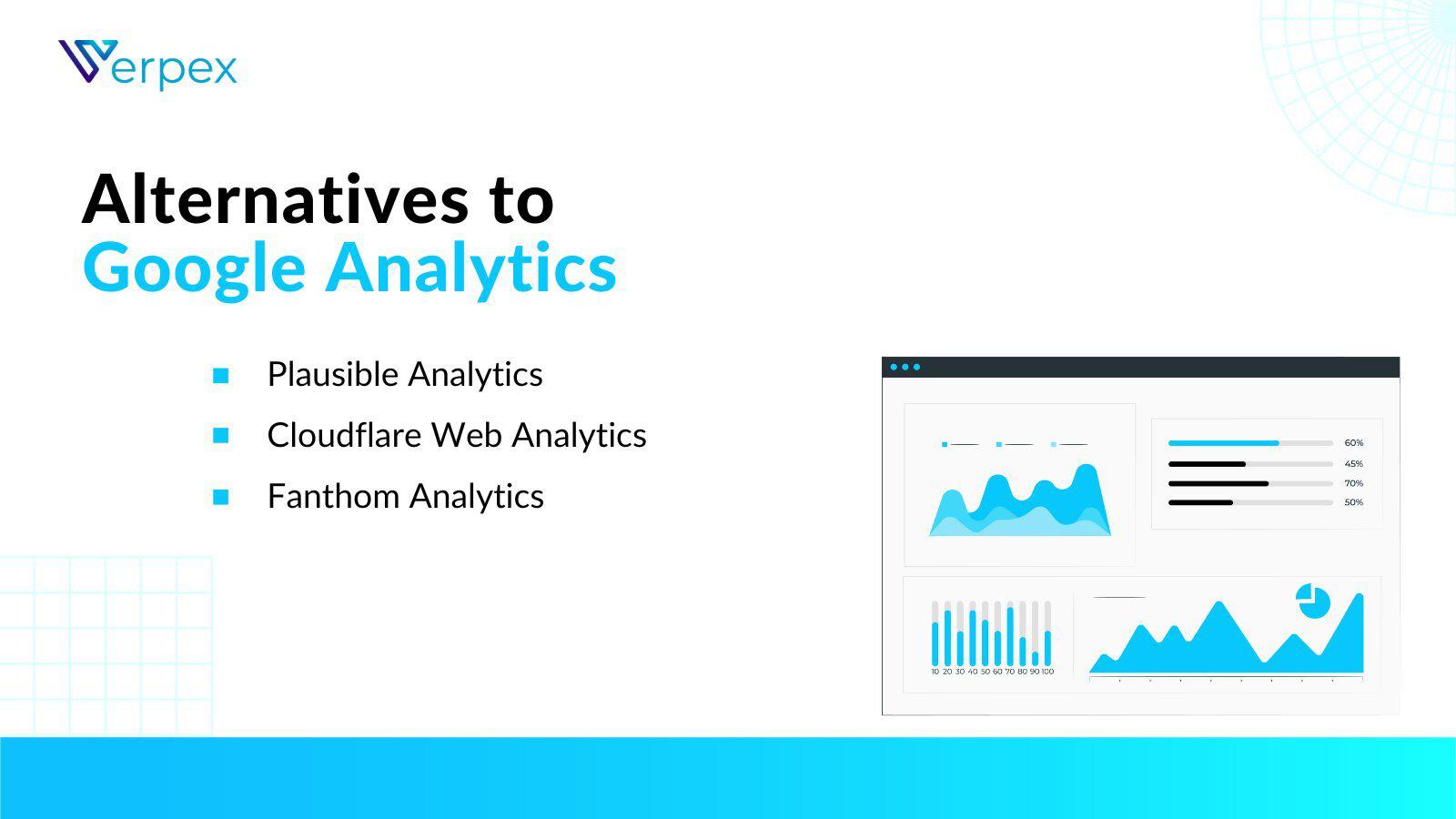
Plausible
For our first GA alternative, let's take a look at Plausible. Plausible markets itself as a privacy friendly (it's completely anonymous, so no need for an annoying cookie banner) and light weight (supposedly 45 times smaller) alternative to GA. It's also an open source solution that - if you choose - can be run completely on your own infrastructure, for free.
Pricing information is a simple calculator that provides options for traffic and monthly versus yearly billing. For my site (300K per month), the monthly price would be $29. For a site with 30K pageviews the price does down to $9.
You can start with a 30 day free trial and when done, get a snippet you insert into the head of your site. The snippet is one line:
<script defer data-domain="raymondcamden.com" src="https://plausible.io/js/plausible.js"></script>
Once installed, you can hop into your dashboard:
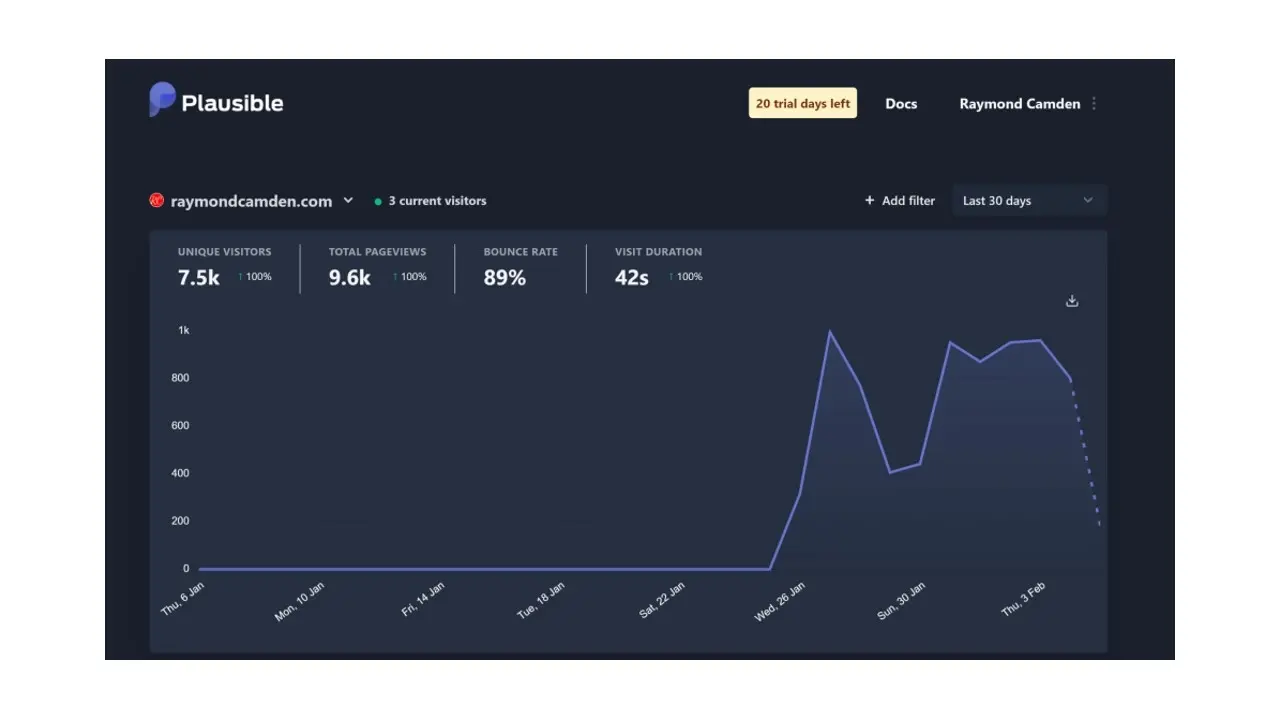
At a glance, you can see total visitors, page views, bounce rate (a visitor who only reads one page), and visit duration. Scrolling down, you've then got sources and top pages. For both, you can click "DETAILS" to get a longer list that lets you load pages and pages of results. Going even lower, you've then got a map showing the locations of your visitors and information about their devices.
Back at the top of the dashboard, you've got multiple options for filtering the date. I selected from the previous Wednesday till this Wednesday to get a better idea of a week of traffic.
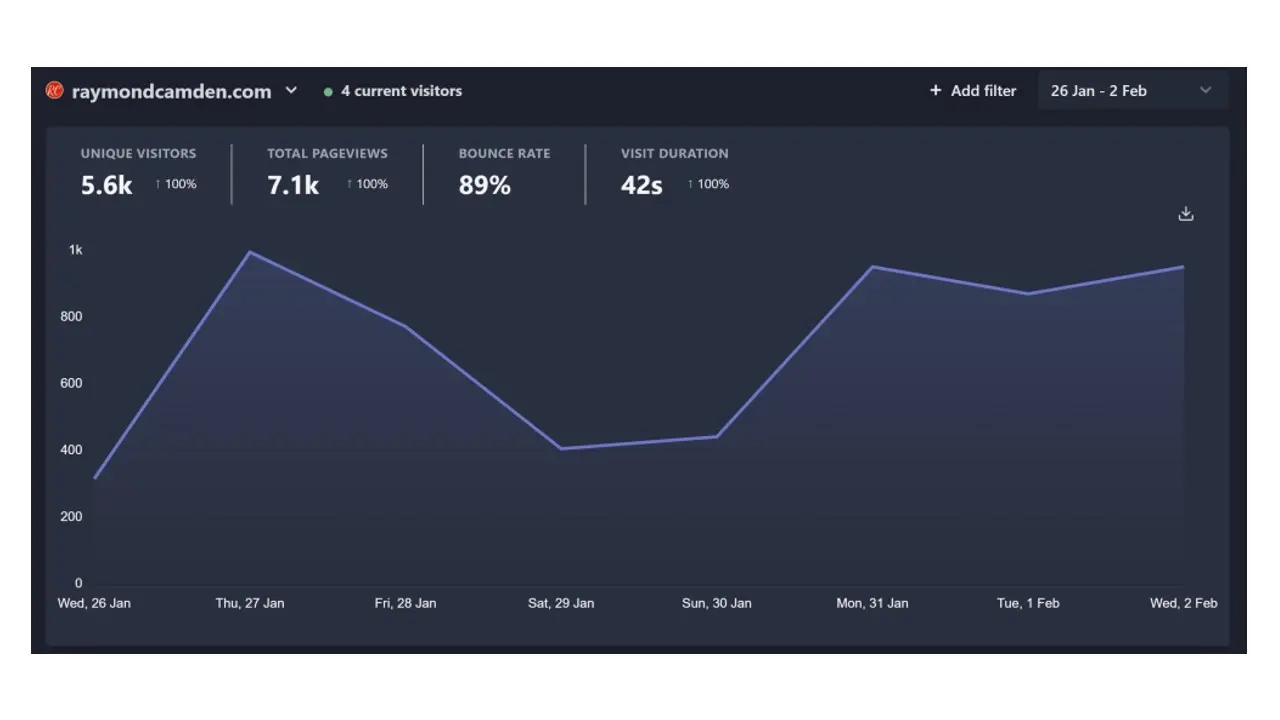
Many of the links on the dashboard become filters. So for example, clicking "Mobile" in Devices filters the entire dashboard:
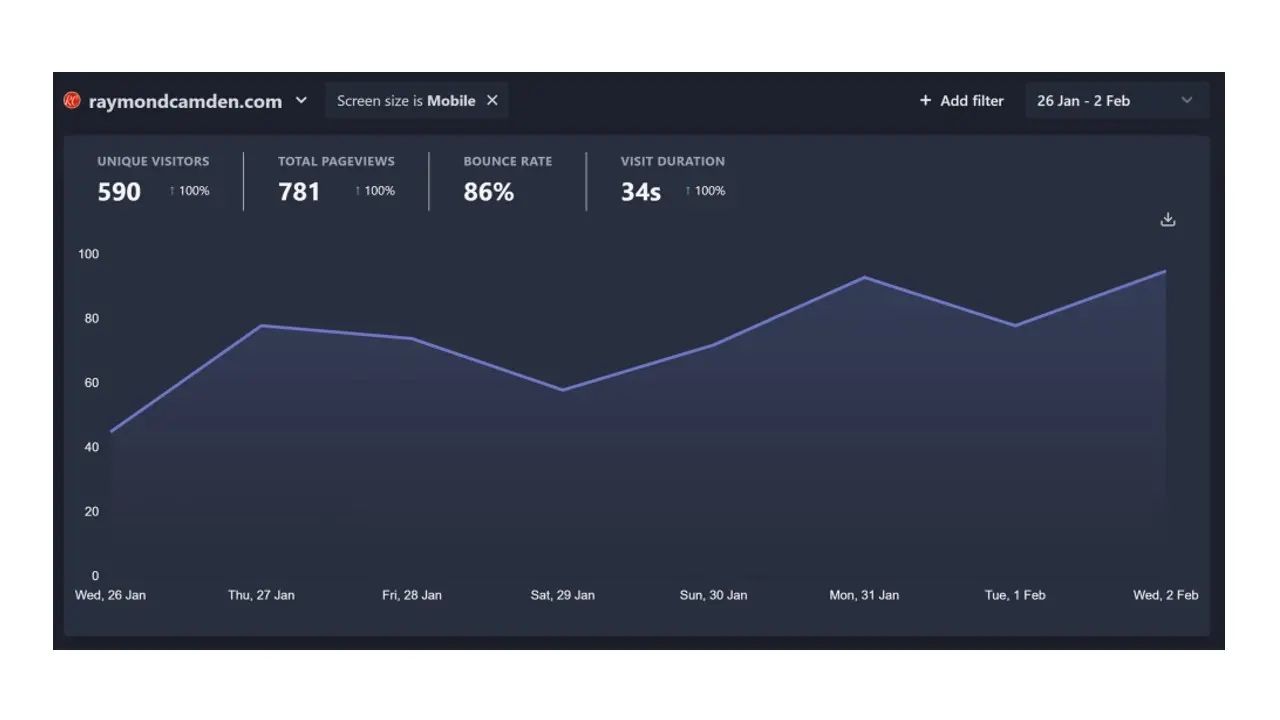
I really liked how simple this was done and easy it was to remove as well. Another aspect I want to call out is under sources. At first I thought this was only providing a domain and what I really wanted to know was the precise URLs of the sites referring traffic. Clicking on a source will drill down, at least for some, and give you detailed information:
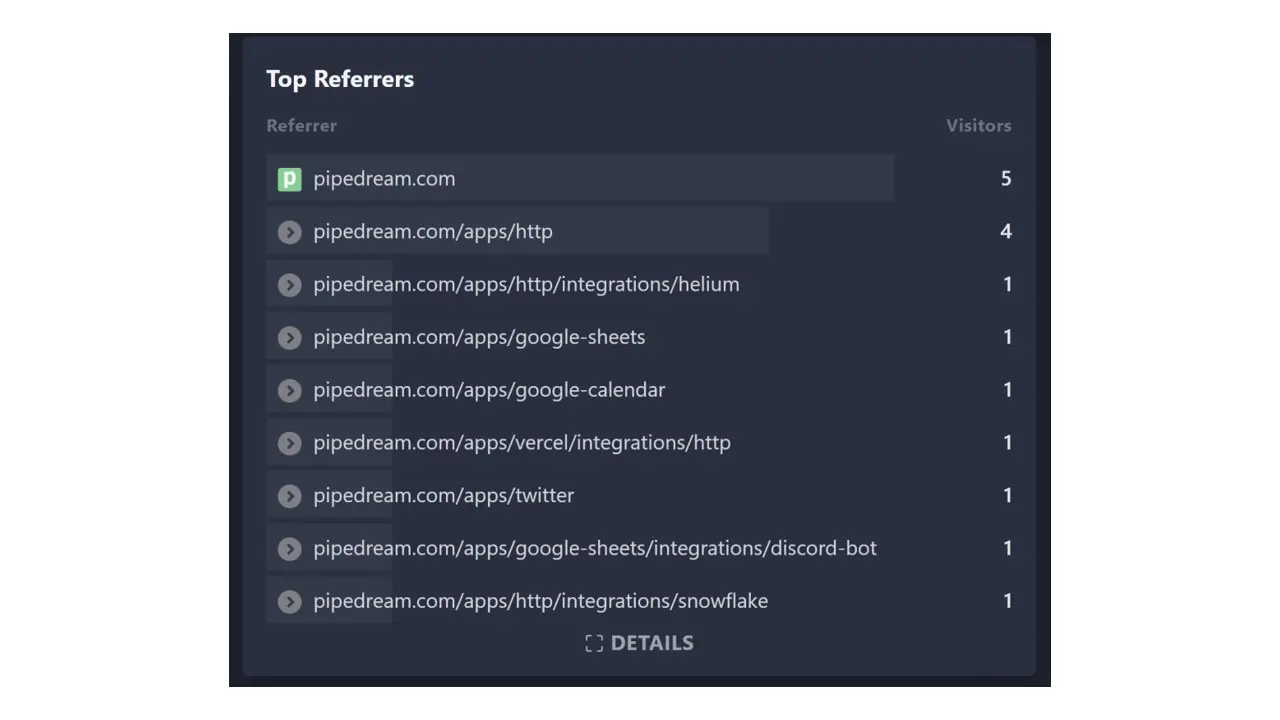
You can quickly then click on a link to open it in a new window and see how the source is linking to your content.
All in a all, I love this dashboard. Looking at it you can figure out a lot about your site rather quickly and it's simply a pleasure to look at. Plausible has extensive docs and even better an API you can use if you want to build your own reports. Plausible also freely shares their analytics: https://plausible.io/plausible.io
CloudFlare Web Analytics
CloudFlare Web Analytics is probably the most bare bones of the services I'm reviewing today, but also the cheapest as it's free. CloudFlare is a huge in the industry for it's CDN and security support, so this is a company you know will be around for some time.
CloudFlare has a somewhat "rough" startup process. While free, their site assumes that your hosting with them. You don't have to in order to use their analytics, but the signup form isn't necessarily clear that you can do so.
When signing up, if you aren't a CloudFlare customer, you'll want to type in the address in the field provided:
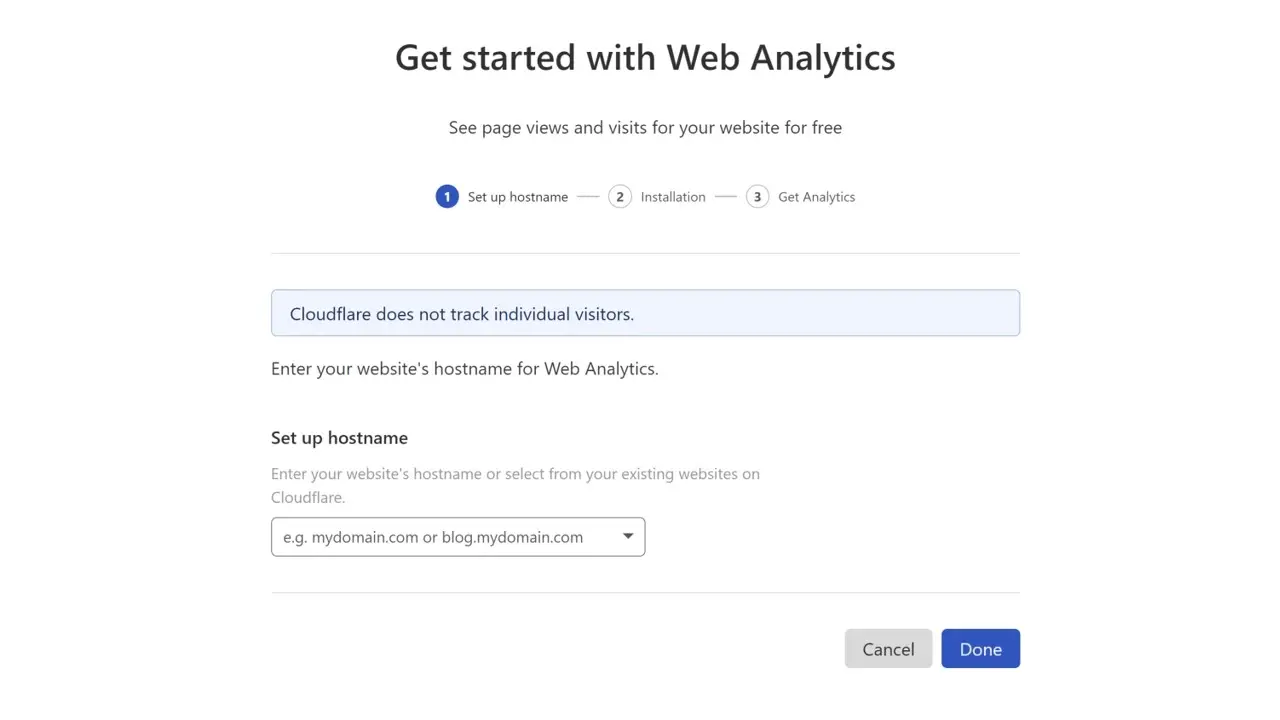
Here's where things got wonky. I typed in my site address, got a warning, not an error, and the Done button wasn't highlighted:
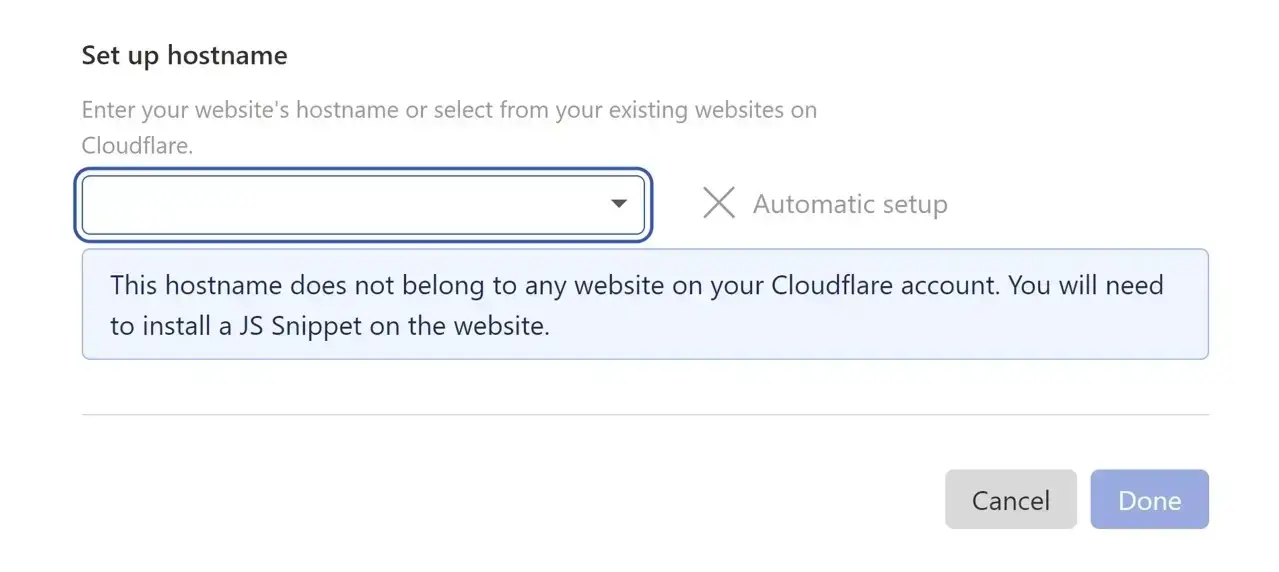
Another issue I ran into is that until you verify your account, you can't setup. But the site showed this error on the bottom of the page (below the footer) and auto dismissed it.
I've reported these UX issues to a colleague who works there and it may be corrected soon, but just note that the setup process may be a bit buggy.
Once done, again, you get a snippet of code. This gets inserted into your site before the closing body tag:
<!-- Cloudflare Web Analytics --><script defer src='https://static.cloudflareinsights.com/beacon.min.js' data-cf-beacon='{"token": "613650266bcc4d069e8636d44b3efcc7"}'></script><!-- End Cloudflare Web Analytics -->
CloudFlare's dashboard is a bit complex, but still gives you a lot of value right up front. (A quick note - the "floating scrollbar" in the screen shot below was not in the UI, but happened when using Microsoft Edge's "Full Screen" photo mode. It's a bit distracting below, but again, not in the real view.)
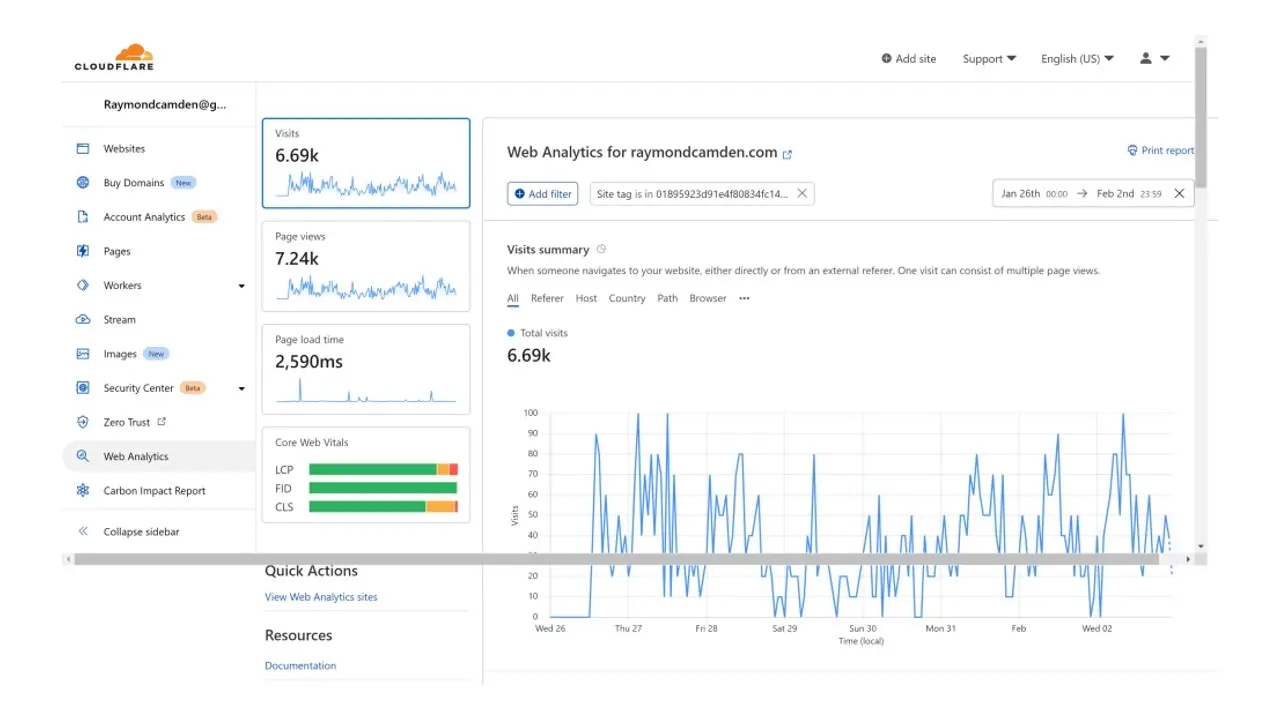
Many of the same reports exist here as in Plausible, but you are restricted to 15 total rows of reports for sources and paths. Also, there seems to be no way to get the exact URL of a source. So while I can see I had visits from pipedream.com, I can't get the path of the page linking to my site.
One way CloudFlare really stands out though is the report on core web vitals. CloudFlare not only gives you information about the traffic to your site, but also how well your web site is performing. Web site performance is an incredibly important stat and the fact that CloudFlare provides that along with traffic data makes it an incredibly attractive option. Clicking on "Core Web Vitals" in the left hand column lets you get more detail about your page performance.
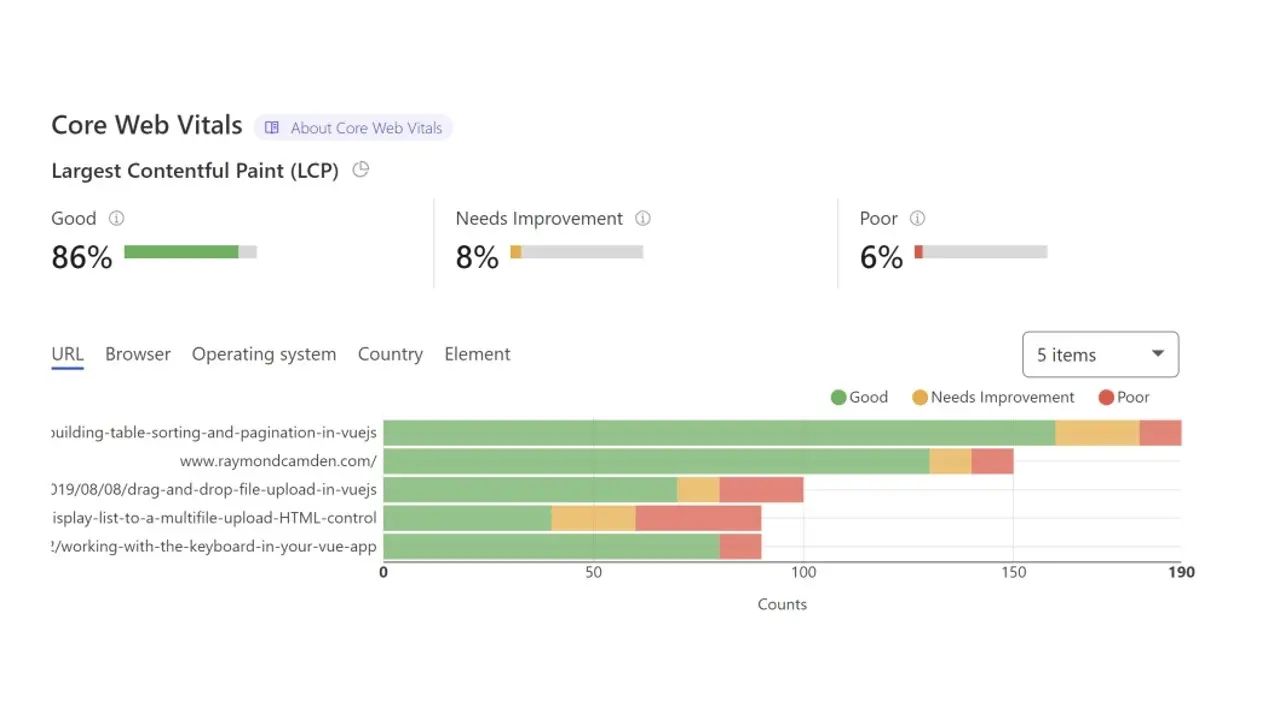
Scrolling down, you can even get more details:
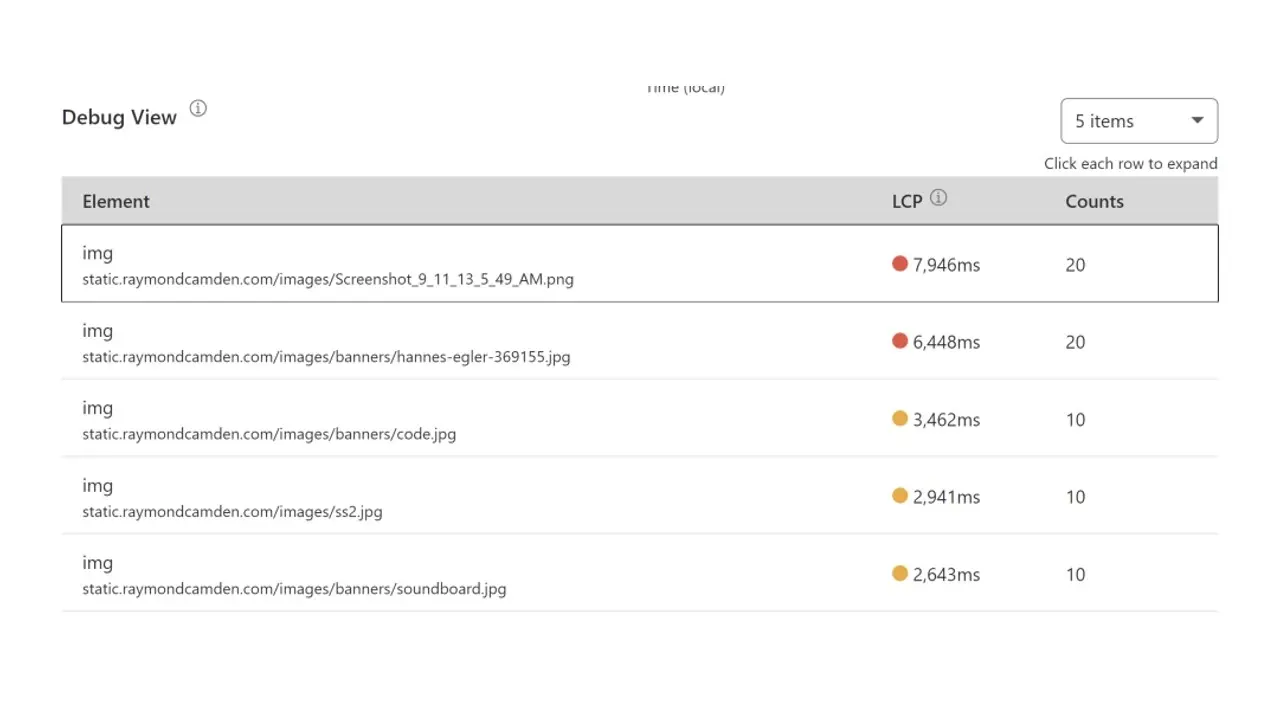
That image mentioned in the top row above? If I click it, I get more details:
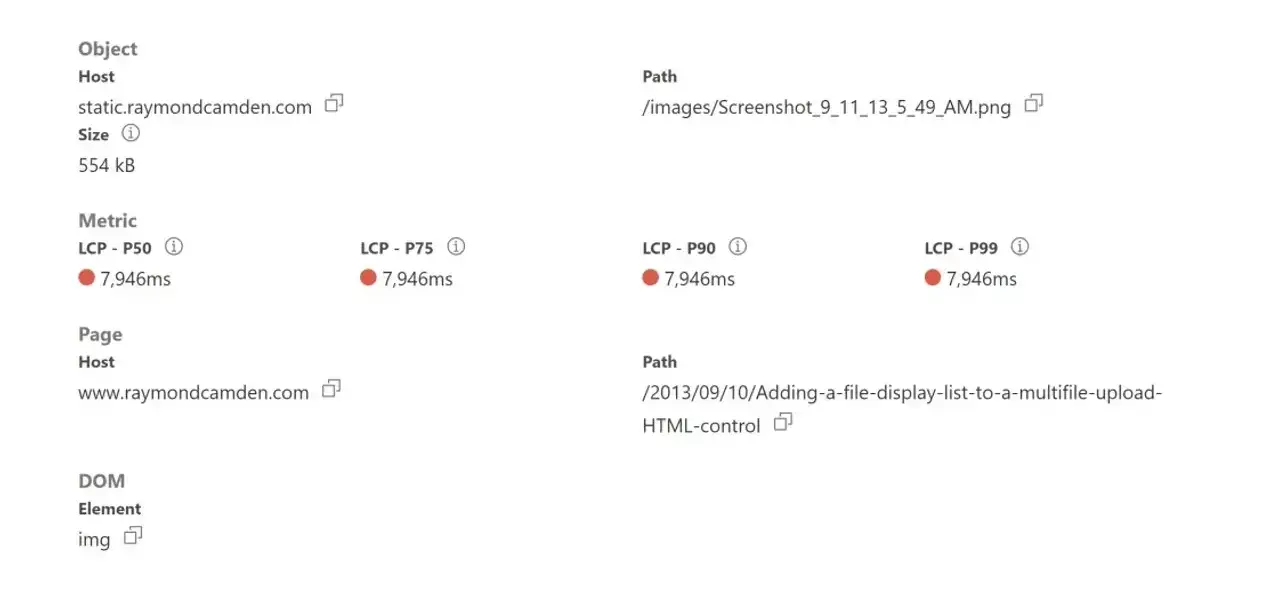
Wow, over 500k. What happened here is that I forgot to optimize an image. CloudFlare's report makes this pretty clear, and even better, shows me the path of the page containing so I know where to go to fix it.
While the setup was a bit problematic, CloudFlare's cost (free!) and detailed performance reports are very valuable.
Fathom
For our third alternative, let's take a look at Fathom Analytics. As with other options, Fathom is privacy focused and will not require a cookie consent banner to use. It also has a quicker, smaller embed script than GA. It also provides uptime monitoring to let you know if your site is down for any reason. Fathom also promises to be completely adblocker proof, supporting the ability to use DNS as a way to help ensure the analytics loads properly. (More details may be found on their site.)
Pricing information indicates that my site would cost $44 a month and a site at 30K page views per month would be $14. This makes it the highest of the three options covered today but still fairly reasonable. One "ding" I'll mention is that the free trial is only for seven days. I really think you need a good month to try out a product like this, or at least ten days to give you a good week of traffic.
Installation is like any other tool like this - you simply include a snippet in the head of your html. Bonus points for the little advertisement in the source:
<!-- Fathom - beautiful, simple website analytics -->
<script src="https://cdn.usefathom.com/script.js" data-site="VEGZFTJH" defer></script>
<!-- / Fathom -->
Let's take a look at the dashboard - easily my favorite in terms of just how pleasant it is to look at:
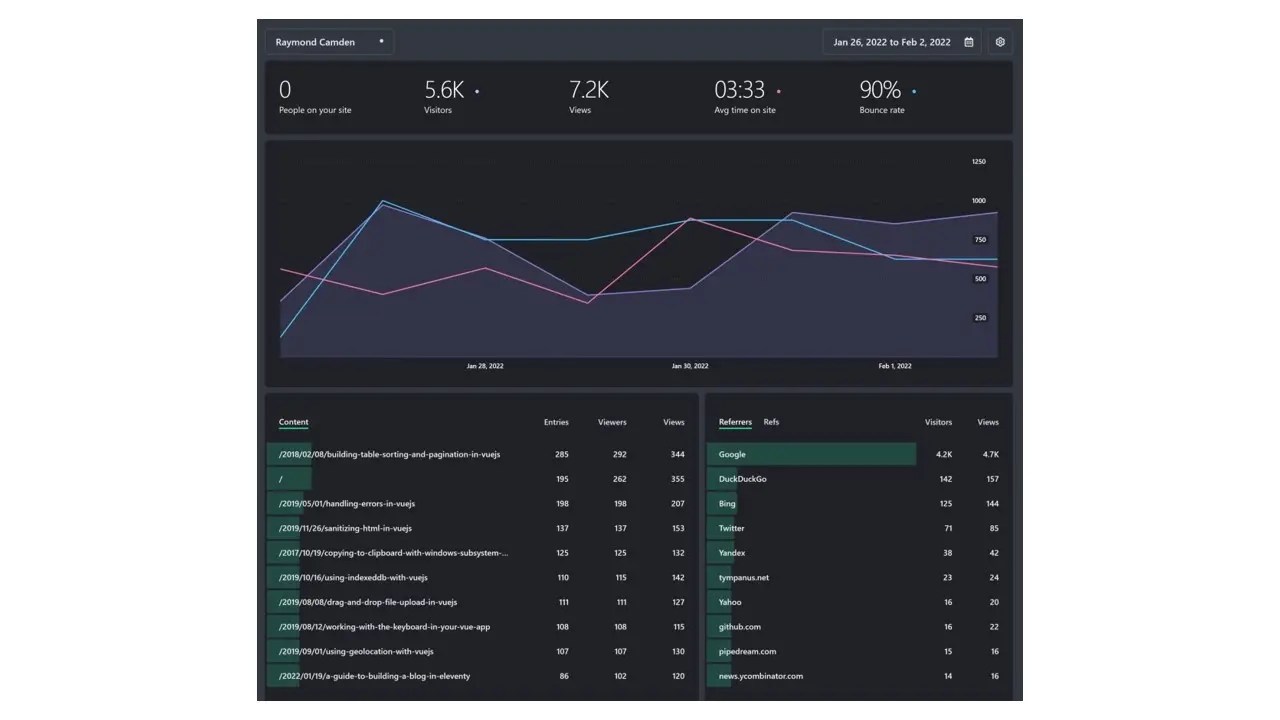
I love, love the look of this. This is polar opposite of GA when it comes to user friendliness. The dashboard contains charts for visits, page views, time on site and bounce rate. Below that is a page views report with a very handy search option so you can look for stats for a particular page. My blog uses a URL format with dates in it so I was able to filter to items from this year by searching for /2022/.
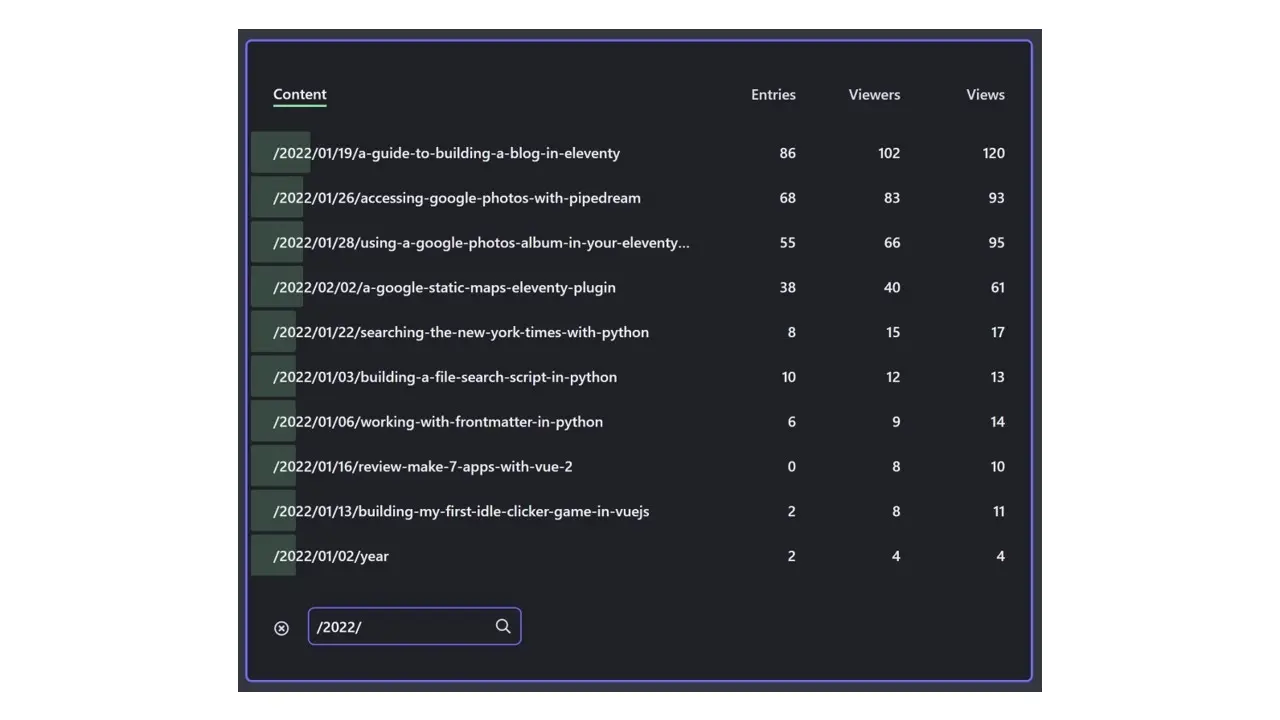
As with Plausible, you can click into a source to get information about the exact URLs.
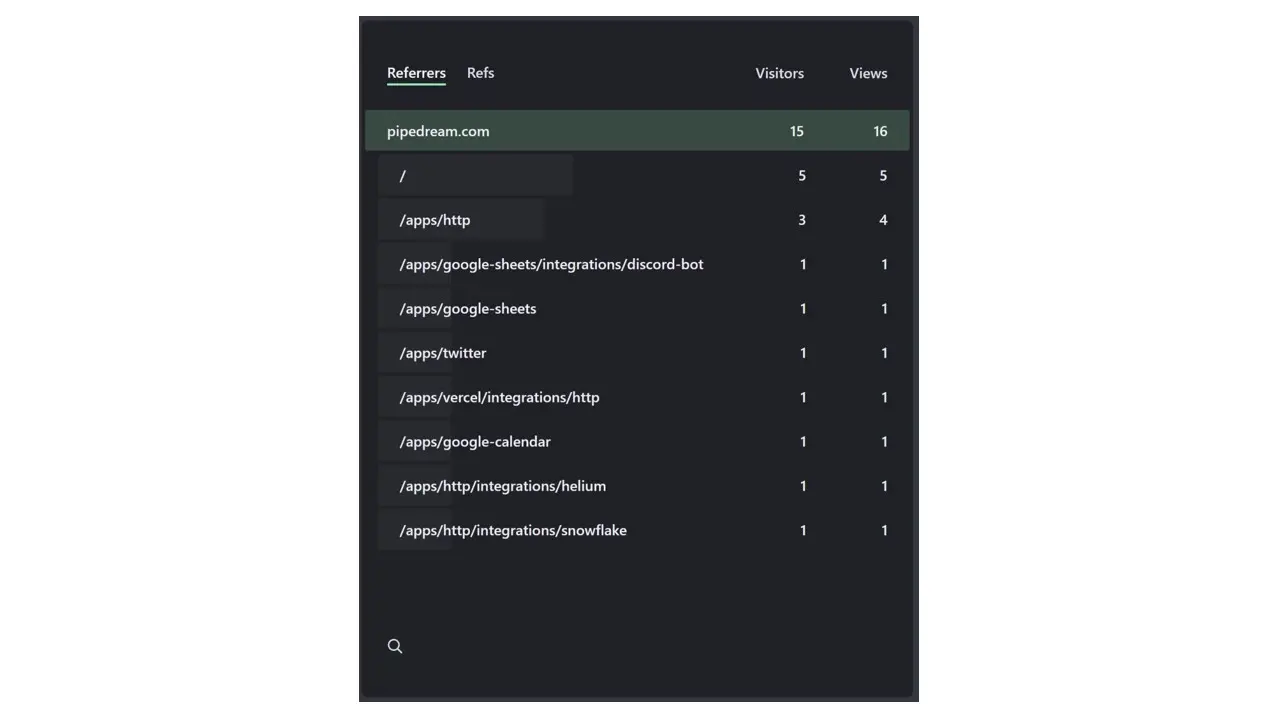
Conclusion
Without a doubt, there are many excellent alternatives to Google Analytics, and almost without an exception each is far simpler to use and much more friendly, especially to non-developers. While you will (most likely) have to pay a bit, the information gained from these sources easily make it worthwhile!
Frequently Asked Questions
How much traffic can shared hosting handle?
Shared hosting serves multiple sites on a single server. The costs of this type of web hosting are low since the users utilize the resources on a single server.
Will HTTPS affect my site performance?
Yes. SSL impacts the site performance since it takes extra round trips to establish a secure connection. But, the increased level of security is worth the wait of a few milliseconds.
Is a website on WordPress safe?
Websites on WordPress are safe, however to avoid hacking keep your website up to date.
How do I choose a design for my website?
One of the most important things when creating a website for your art is the design. Even though your pieces of art might be amazing, people will leave if your site is hard to navigate. This is why it’s important that the site is easy on the eyes and easy to navigate.

Raymond Camden is a Senior Developer Evangelist for Adobe. He works on the Document Services APIs to build powerful (and typically cat-related) PDF demos. He is the author of multiple books on web development and has been actively blogging and presenting for almost twenty years. Raymond can be reached at his blog www.raymondcamden.com and social media.
View all posts by Raymond Camden



















